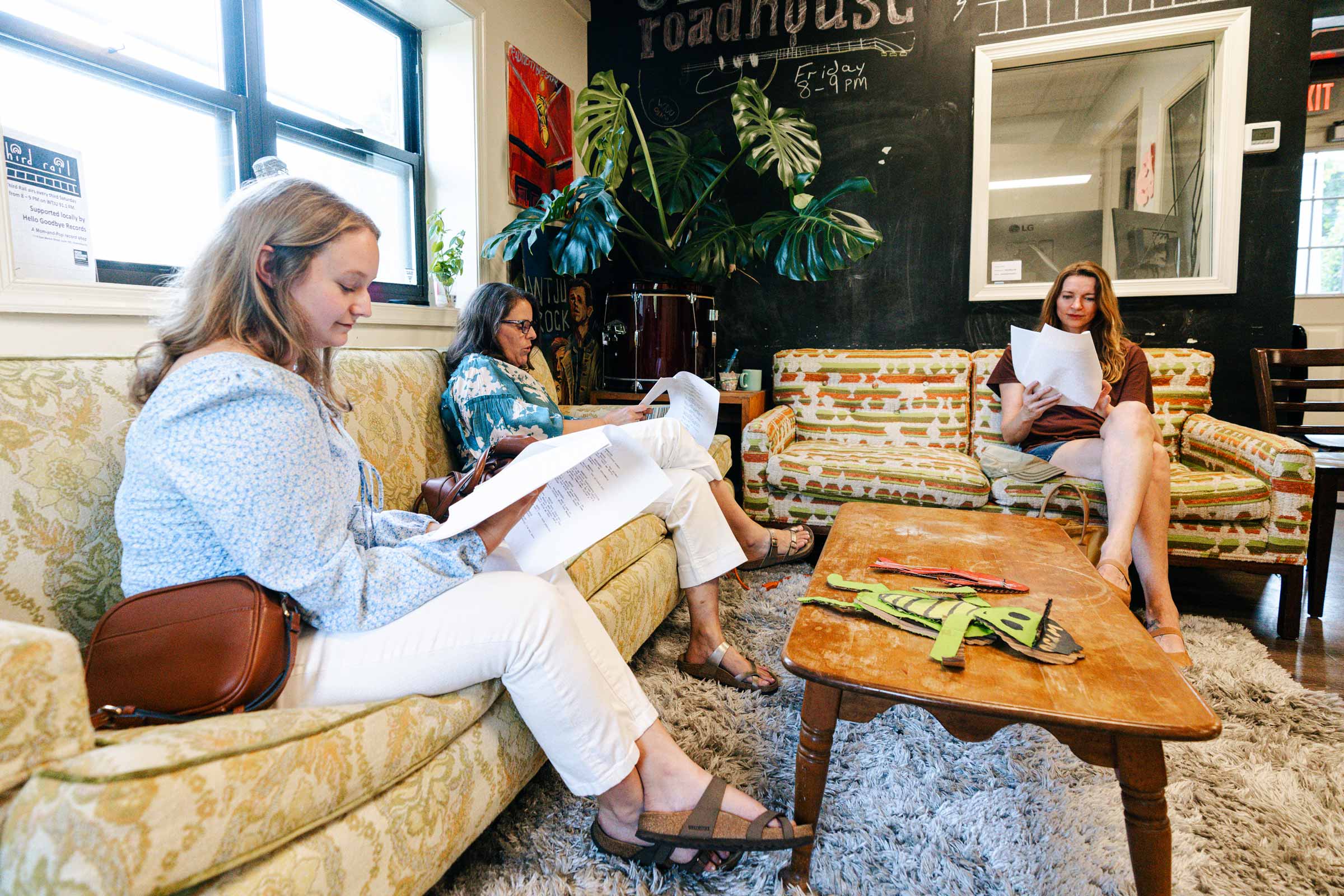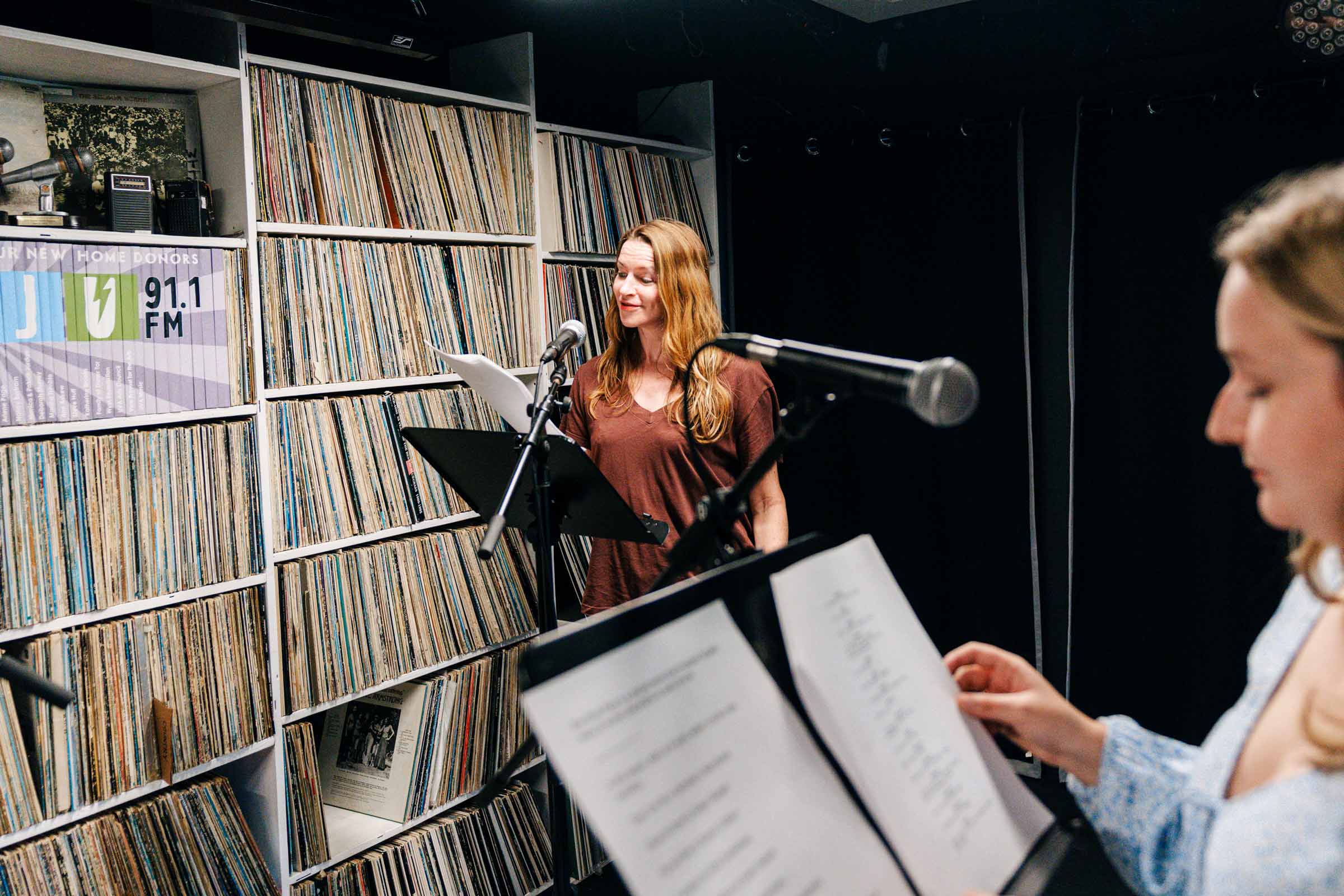‘She Wrote Plays’ and WTJU Is Streaming Them

In early 2020, University of Virginia associate drama professor Doug Grissom was looking to buy some recording equipment.
He had found a set of plays that female playwrights had written nearly 100 years ago, that begged to be adapted as audio dramas. He planned to do it on his own.
But then the general manager of UVA’s WTJU radio station, Nathan Moore, reached out asking if he had any podcast ideas. Grissom pitched adapting the plays as audio dramas.

Senior administrative assistant UVA Library Evelyn Garey, drama lecturer Cady Garey and Julia Robertson read their lines at WTJU's studio. (Photo by Emily Faith Morgan, University Communications)
“He said, ‘Doug, we can get a grant for this,’” Grissosaid. They did receive a Faculty Research Grant for the Arts for the project. Plus, Grissom would have WTJU’s support and audio expertise on his side.
COVID-19 put the series on hold, but it revived last year.
Grissom, an experienced playwright himself, had become more familiar with audio dramas through working on a scripted podcast with Moore and a group of drama graduate students. That series, “The Perfectly Circular Rock,” was a sci-fi audio drama about what happened to a small community when a huge, perfectly spherical rock dropped in the center of town.
The new series – which would later be titled “She Wrote Plays” – strikes a different chord.
Two of the eight shows in “She Wrote Plays” were performed for a live audience in April, with the remaining six set to premiere this week on WTJU’s podcast collective, Virginia Audio Collective. You can also stream it on Apple Podcasts, Spotify and YouTube. The plays in the series vary in theme and tone, from dramatic to comedic, but all place women at the forefront. Some even feature exclusively female casts.
“They’re not just about relationships between men and women, but between women and other women,” Grissom said.
Roughly 100 years after they were first published, “They That Sit in Darkness” and the other dramas will reach contemporary audiences in a modern format.
“We’re living in a renaissance of audio,” Moore said. “The podcast medium has made it possible to really reach a wide audience. … Podcasting enables so much creativity.”
Despite the quality of the scripts, many of the plays and their playwrights were forgotten over time, as critics tended to dismiss female writers.
“These playwrights were really part of an era where American theater was kind of growing up,” Grissom said. “Plays were melodramas, or very light entertainment. … For lack of a better word, American theater before these playwrights was very old-fashioned.”
Because of the plays’ range in themes and subjects, Grissom reached out to two students for help adapting two of the plays. One of those is rising fourth-year student Mary Hall. Other students acted in the audio dramas.
Hall, though she majored in drama, had yet to take a class with Grissom. But her script submission to UVA’s New Works Festival caught his attention.

Robertson and her fellow actors finish recording an adaptation of “Overtones” by Alice Gerstenberg. (Photo by Emily Faith Morgan, University Communications)
“He emailed me, and he said, ‘Hey, I love your play for New Works. I can’t give you a decision on whether or not that can get produced yet, but I was wondering if you’re interested in helping me with this project about highlighting female playwrights,’” Hall said.
Grissom selected Hall, who is Black, to adapt “They That Sit in Darkness,” by Mary Burrill. The work focuses on Black motherhood and maternal health care.
“This was a completely new experience for me, which is what made it so much more enticing,” Hall said.
For Hall, who is co-director of WXTJ 100.1 FM, WTJU’s all student-run sister station, and pursuing a second major in African American studies, the project felt like a natural fit.
In the summer of 2023, Hall began adapting the play for a podcast format, balancing the project with a part-time job. She continued to work on “They That Sit in Darkness” in the fall semester when she finally took a playwriting course with Grissom. After finalizing the script, she was ready to take on another new role: co-director.
“Doug is who I deferred to at the end of the day for all the decisions that I was making, but he really let me have a lot of the driving force,” Hall said.
Hall, Grissom and Moore share a goal: that audiences will realize their lives aren’t so far removed from those of people living decades ago.
“What I want people to get out of these dramas is the experience of something meaningful that helps them reflect on their lives,” Moore said.








